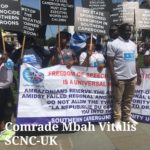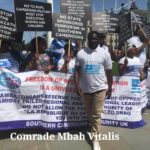Conflict in the Southern Cameroons
By
Mbah Vitalis
SCNC-UK
-
Cameroon has its roots in colonial history just like any otherAfrican country. During the 19th century, the territory ofCameroon was ruled by many local kingdoms. In the 1880s,the Germans in their quest for colonisation took control ofCameroon, making it their colony in 1884. After World War I,when Germany was defeated the League of Nations handedcontrol over the territory to Britain and France who divided itand established separate administrative systems. Bothcountries assumed responsibilities over the territory until afterthe second world war when many African countries starteddemanding their independence.During this period, Britain did not grant independence toSouthern Cameroon, saying that they were not economicallyviable and could only survive by uniting with FrancophoneCameroon or Nigeria. In a plebiscite organised in the BritishAdministrative part of Cameroon on the 11 of Feb 1961, thenorthern part of Anglophone Cameroon voted to join Nigeria.Neither option was as popular in the southern part which, inthe absence of a much-preferred option for separate statehood,ultimately joined with French Cameroon.When the two territories reunited in 1961, a new constitutionwas drafted to define the new union as a federal entity inwhich the autonomy of the English-speaking minority wouldbe protected. However, in 1972, a controversial referendumtransformed the federation into a unitary state, effectivelyending the autonomy of the Anglophone regions. The fact thatthe will of the Anglophone population was overruled in 1961
-
2and the subsequent systemic discrimination andmarginalization they suffered under successive governmentsdominated by Francophones planted the seeds of the currentseparatist conflict.The conflicts and crises in the Cameroon Anglophone regionare between the part of the country that was once run by theBritish (1916-1961), today widely referred to as Ambazoniaand the larger part once ruled by the French (1918-1960).These conflicts were foreseen in the decolonisation of colonialcountries, peoples, and territories.The conflict began in October 2016with teachers and lawyers taking tothe street protesting the infiltrationof the French legal system into theAnglophone systems. By the end of2017 this turned into an armedstruggle and has of date resulted ina civil war. It should be noted thatin the conflict since September 2017 1,850 people have died;
most schools have been closed for the past three years;
than 170 villages have been destroyed; 530, 000 people have -
been internally displaced and 35,000 have sought refuge inneighbouring Nigeria. The conflict has also devasted the localeconomy which accounts for about one fifth of the country’sGDP.
-
The conflict started when lawyers and teachers took to thestreets protesting that the government should stop sending only lawyers and teachers who spoke French and not English to manage the affairs of the Judiciary and Educative sectors of
-
the anglophone regions. Those who could not speak Frenchwere brutally handled by the forces of law and order.The civil society then joined the lawyers and teachers andthey were equally brutally handled by the police. The interimAnglophone government of Southern Cameroon has declaredthat the cities become ‘Ghost Towns’ on Mondays, when no-one goes out, as a protest to the Francophone government.The majority of the protesters were also brutally treated by thepolice and many trade unions like the Consortium werebanned. Many union members who were to dialogue with thegovernment were arrested while others are still on the run.Those arrested were charged with Terrorism and an attempt tochange the form of the state from a Unitary State to a FederalState what it has once been since the 70s. The governmentbecame aggressive in handling the crisis, even shutting downthe internet in the two anglophone regions to stop peopleorganising and passing information, or receiving orders fromsupporters in the diaspora.The president of French Cameroon who has been in powersince 1982 failed to manage the conflict adequately and aftercriticism from the international community he restoredinternet connection into the regions and released some of theactors arrested at the beginning of the crisis.The move was seen by a majority of Anglophones as a shamby the government and on the 1stof October they tookto to thestreet and restored their independence and imposed theirsupremacy in the region by hoisting the Ambazonian Flag.
-
4The government, repressive as they have always been, killedabout 3000 people, while about 600 000 were displaced.The conflict has been dragging for years now with Separatistson the one hand claiming that independence is just around thecorner while President Paul Biya and his government stillthink a very quick and strong military intervention will givethem victory.The conflict has already left so many displaced persons and somany killed in the Anglophone regions that it is only theintervention of both local and international communities thatis likely to bring it to an end.
Mbah Vitalis


